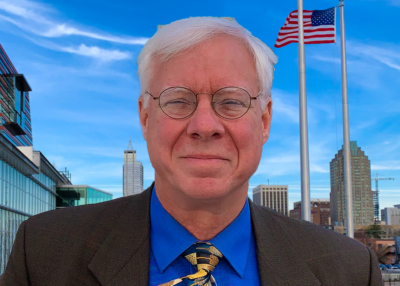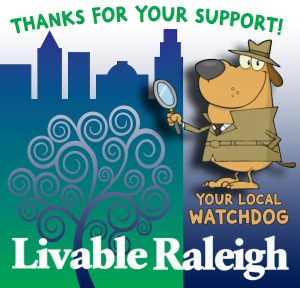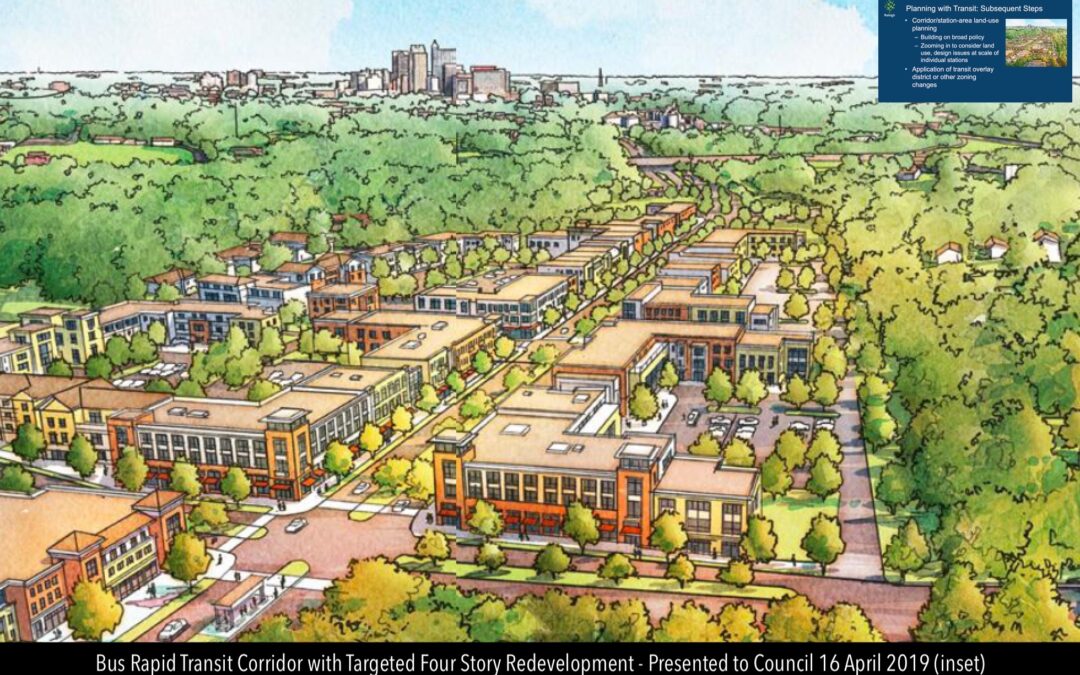
Russ Stephenson, LEED Accredited Urban Design Consultant and Architect (ret.), NC American Planning Association awards, Sierra Club Life Member, Raleigh Planning Commissioner, Raleigh City Councilor At-Large, GoTriangle Board Member, Livable Raleigh Advisory Committee
Russ delivered the following comments to the Planning Commission Committee of the Whole on August 29, 2023
The New Bern Avenue Bus Rapid Transit (BRT) project is record-setting in at least three ways: (1) It is Raleigh’s largest ever transit project at $97M, plus (2) it is the largest ever city-initiated upzoning of private land for redevelopment at 700+ acres. And third, the impacts of these two items are overlaid on Raleigh’s highest percentage Black population corridor, creating (3) the greatest ever challenge to redevelop without forcing out the same low-wealth and Black families that transit is designed to benefit the most. The city’s commitment to dismantling our race biased policies and systems will be put to the ultimate test here.
Staff’s time and your [the Planning Commissioners] time is now being spent chipping away at the predictable dislocation impacts that were set in stone years ago when the EDAT (Equitable Development Around Transit) community engagement process failed to fairly solicit feedback from low wealth and Black families in the corridor, about how rising rents and taxes might force them out of their homes.
The flawed engagement process is documented in these February 2020 comments at one of the engagement sessions in comments by Raleigh Transit Authority Chair Tolulope Omokaiye:
The flawed engagement process minimized displacement concerns while validating the proposed mass upzoning, and turning New Bern Avenue into the biggest economic development opportunity in the city’s history, all at the expense of the people who live there now and of Raleigh’s history.
I appreciate staff’s amended CP-7-22 Comp Plan policy items intended to mitigate race biased impacts and overall dislocation, but it appears that the TOD overlay upzonings will be implemented long before any of the new Comp Plan programs are implemented and fully realized. The effect of upzoning first and mitigating the upzoning’s dislocation impacts after the fact makes no sense and will only perpetuate Raleigh’s ingrained legacy of racial inequities.
Here are comments by Smart Growth America CEO Calvin Gladney about ensuring transit does not cause displacement:
Rather than framing your review around chipping away at the impacts of the front-loaded mass upzoning, consider setting aside the inside-the-beltline upzonings for the moment and focus first on implementing the Comp Plan dislocation mitigations while the BRT line is being constructed. This will allow time to evaluate how the $97M infrastructure investment itself promotes redevelopment, similar to the city’s investments along Hillsborough Street near NC State University. There will always be time to do large-scale overlay upzonings later, but you won’t be able to take it back if you go too far with these two record setting changes.
The re-envisioning of Hillsborough Street near NC State University is a great example of how a smart city transportation investment of $30M – without any city-initiated upzonings – improved the safety and mobility along Hillsborough Street while attracting $500M in private investments. By almost every measure – whether it be preserving affordable neighborhoods, providing new student housing, attracting new retail and reducing accidents while improving every non-car mobility mode – the thoughtfully planned and incrementally executed redevelopment of Hillsborough Street has been a huge success and is a better model for the future of New Bern Avenue.
New Bern Avenue is living proof of the bigoted depredations and dispossessions our country and our city have imposed on Black Americans. It is also living proof of Black Americans’ determination to fashion lives and communities of faith and hope in the face of overpowering forces of greed and racism. Of all places and all projects which have the potential of restorative justice and to make good on Raleigh’s pledge to dismantle the city’s policies and systems of racial inequity and oppression with equitable transit, this is it.
If you appreciate the kind of reporting we bring to you
|
Please donate $10 or $20, Thanks for supporting |
 |

